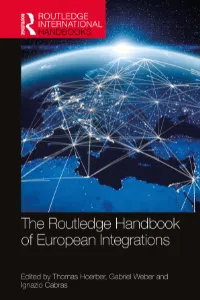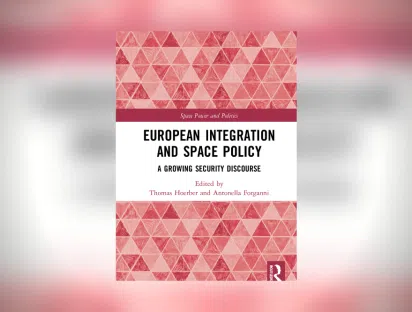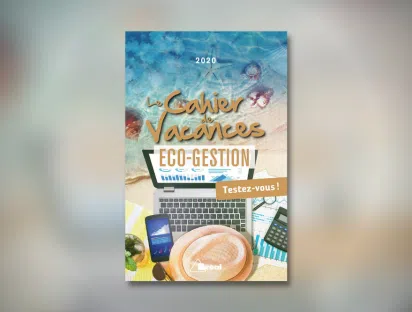
The Routledge Handbook of European Integrations, edited by Thomas Hoerber, Gabriel Weber and Ignazio Cabras, provides an innovative approach to European integration. The topic is divided into the three axes of culture, technology and tangible goods. These distinct parts cover a particularly significant number of dynamics and challenges of integration.
The purpose of the book is to develop a unique perspective of the subject based on completeness. Many facets of integration analysed in the book are in fact usually forgotten, even neglected, in the literature, whereas this handbook ties them together to compose a thorough and authentic portrayal of European integration.
Based on an initial open call for contributions, which was intended to let various experts of European Studies contribute, the handbook is a gateway to conventional as well as out-of-the-box topics. At the same time, it also fosters innovation in its broader research field. The three editors worked with 36 contributors from various countries and organisations, and with different areas of expertise. The contents of the handbook broaden the subject’s horizons for readers. It encourages thinking; not only in the way in which European integration has taken place, but also in defining the forms of integration that might be sought in the future.
Edited by Thomas Hoerber, Gabriel Weber, Ignazio Cabras
Published February 28, 2022 by Routledge, 508 Pages
We interviewed Professor Thomas Hoerber, who co-edited this high-level research book, about the current state of affairs and perspectives of European integration.
1. What are the key future aspects of integrations on which the EU should focus?
With the Ukrainian crisis, inevitably it will be defence. The question is whether all EU members will put up 27 defence policies or one. If it is one, we are going towards the United States of Europe, as the book suggests in the Introduction. In that sense the current crisis can act as a federator. The key issue in this field will be national or a European nuclear deterrence programme.
2. An important factor in the non-integration of Ukraine into the European Union was Europe’s intention to avoid provoking serious tensions with Russia, which could have triggered a crisis similar to the one we are currently facing. Is the EU still fully in control of its integration decisions?
Ukraine has asked for immediate admission to the EU under a special procedure. François Hollande said in response to this request, that defending Ukraine is the immediate concern. Admission to the EU comes later and has to be well thought through.
The EU is not a classical alliance system which reacts to threats and political or military needs. Some of that remains of course, but the EU is a value-based community. This is reflected in the Acquis Communautaire and the chapters of it that each candidate state has to validate, e.g. the rule of law. Beyond the considering EU values, this process provides answers to power politics in that it is the only one on the international stage which tries to insert objective criteria – the acquis – into what used to be a wrangling for power and influence.
Rules and values are the soul of the EU, which is there for a good reason. This allows for control of the integration process and should also be the framework for Ukrainian admission.
3. Can we want the EU to become the United States of Europe, as mentioned in the publication?
That is the question; whether we want to create some big political entity in the world. Some may say that we should not, because of German history, because of colonialisation, because of the faults Europe has committed in the past. What is certain is that the United States of Europe will lead the EU down the road of power and that can corrupt, as we can clearly see in Putin’s Russia. European democracy is designed to moderate such corruption, similar to American democracy, which leads me to believe that the EU could resist the greatest temptation that the US has just shown by resisting Donald Trump. Eventually, this leads to the question: do we have a choice? Or rather, do we have to see the world as an eternal vying for power among states?
The EU and this book have shown other answers which some might summarise as post-modern governance, e.g. in the field of sustainability. The current Ukrainian crisis is pushing the EU more and more towards these classical power considerations. The aspiration for a better future beyond the nation state, which has always been one of the promises of the European integration process, should not be forgotten. So, we must be careful to avoid copying the same mistakes that European nation states could make in the creation of a United States of Europe. The EU has shown its difference as well as its efficacity in the current crisis. It will make its own way, humbly, based on values and rules which may be boring, but which are much better than pure power that leads to war.







